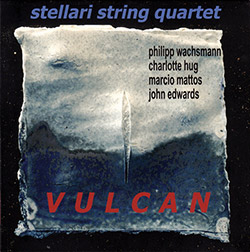
At 3:03 of "Yasur," the third piece on Stellari String Quartet's second album, newly released ten years after the first, there's a major chord. Everything else stops for it. It seems to come from Marcio Mattos' cello; he's second from the left, just beside violinist Philipp Wachsmann and immediately left of violist Charlotte Hugg, leaving double bassist John Edwards to play from the far right. It's only a major chord, played pizzicato, and there's absolutely no practical reason why it should have tossed this listener into a moment approaching cognitive dissonance. Speed and context certainly play their roles, as there isn't a quicker-witted and more interactive group on the planet. Listen to the knotty but unified ascent just preceding the sonority in question or to the immediate return to that snap-crackle-and-pop aesthetic to get an idea of improvised music and of ensemble playing at its finest, but why the major chord? Why then, I might as well ask, the chromatic motive Hug plays at strategic points throughout the first album?
The contentious sonority implies nothing and everything. It is a moment within moments, a representative grabbed at random from a series of disconnected connections, typifying, as Caroline Kraabel's absolutely gorgeous notes express, the points at which sounds in space become unfiltered galaxies, contrasting or not, touching or not. Some are static, and some flow into each other with the fluidity and refreshment of cool water. The initial moments of "Kilauea" manage both on a subtly hushed but massively energetic dynamic plane, each gesture a manifestation of immediately preceding energies while engaging in a subdued but intense forward propulsion, each utterance equal parts reminder and harbinger. It might be amusing and edifying to see a timbral analysis with this album as focal point and microhistory. Take, for example, the staccato and pizzicato sounds commencing "Ambrym," the disc's closer, sounds so unified but also, and perhaps ironically, disparate that their confluence seems nearly implausible.
There is no satisfactory way to summarize this music. Like a blizzard or hurricane, one can only survey the landscape before and after, accounting for differences while waiting to measure their impact. This quartet will offer no love to the impatient, but for those willing to explore those galaxies and their components of varying size and dimension, the voyage will be one of limitless discovery.
Comments and Feedback:



More Recent Reviews, Articles, and Interviews @ The Squid's Ear...


|

